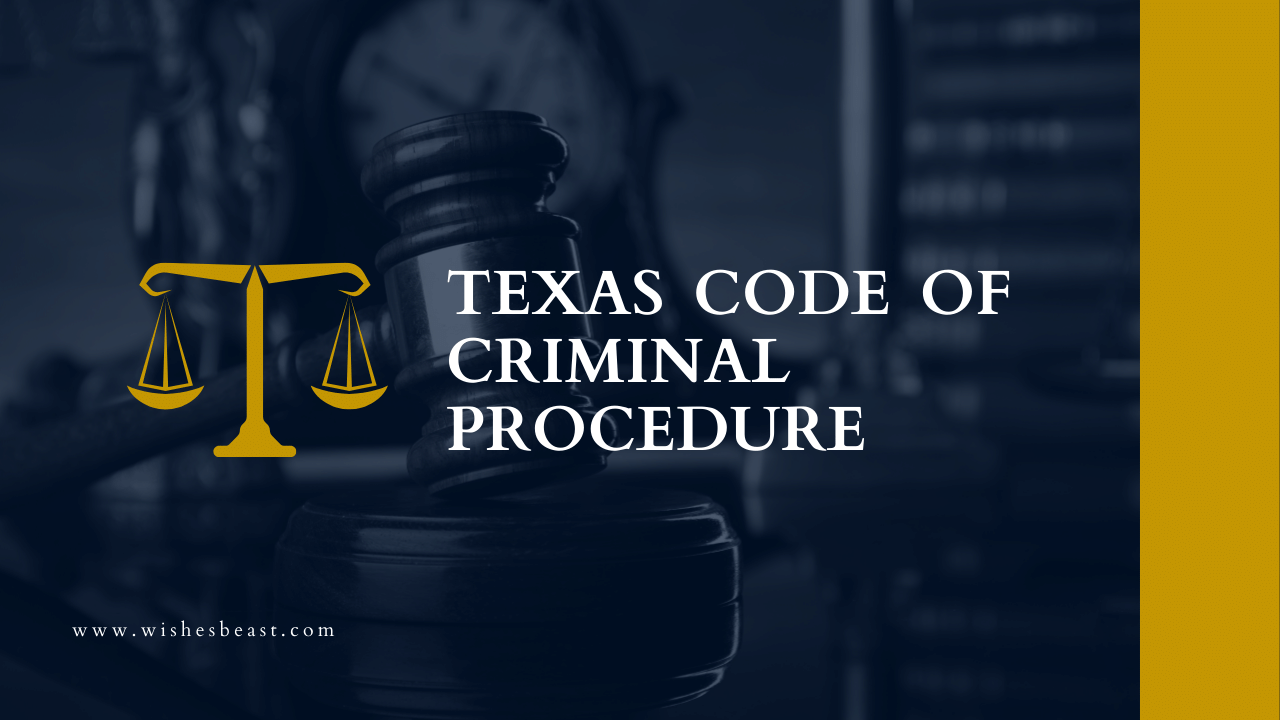In the realm of criminal justice, every state has its unique set of regulations and rules that define and direct the workings of the legal system. In Texas, the codified set of these laws is known as the Texas Code of Criminal Procedure. This document plays a critical role in maintaining the fair and efficient operation of the Texas criminal justice system.
What is the Purpose of the Texas Code of Criminal Procedure?
Fundamentally, the Texas Code of Criminal Procedure sets the stage for how criminal laws are enforced, providing a blueprint for the Texas criminal justice system. This monumental document outlines the rules that govern criminal proceedings – from initial arrest and detention procedures in Texas, through trial and verdict, and finally, to the sentencing and appeals process.
One of the central objectives of the code is to uphold the rights of both the defendant and the plaintiff, creating a balance that allows justice to prevail. It seeks to ensure a fair trial, provide adequate defense rights, and maintain a strict protocol for evidence handling and witness testimonies.
Texas Code of Criminal Procedure

The Texas Code of Criminal Procedure is a comprehensive and detailed guide, divided into various chapters, each dealing with a particular aspect of the criminal procedure. Some of the most crucial components include:
Detention Procedures in Texas
When law enforcement officers apprehend an individual suspected of committing a crime, the rules of the Texas Code of Criminal Procedure come into play. The code specifies that an arrest must be based on “probable cause,” which means that there must be reasonable grounds to believe that the person committed the crime.
The code also covers the issuance of search warrants and protections against unreasonable searches and seizures, ensuring that the rights of the individual are protected even during this initial stage of the criminal justice process.
Texas Criminal Trial Process
The criminal trial process is an integral part of the Texas Code of Criminal Procedure. The code outlines the steps involved in a trial, including jury selection, presentation of evidence, witness testimonies, defense arguments, and final deliberation.
Texas Grand Jury Proceedings
In the Texas criminal justice system, grand juries play a pivotal role. Composed of citizens, the grand jury reviews evidence and decides whether there is sufficient cause to charge someone with a crime. The proceedings are confidential to protect both the investigation and the individuals involved.
Texas Criminal Sentencing
Once a defendant is convicted, the next phase is sentencing. The Texas Code of Criminal Procedure stipulates the guidelines judges use to determine the appropriate sentence. These guidelines account for factors like the nature and severity of the crime, the defendant’s past criminal history, and other mitigating or aggravating circumstances.
Texas Criminal Appeals Process

The Texas Code of Criminal Procedure also elucidates the process for appeals. The convicted individual has the right to appeal their case, and the code provides the structure and guidelines for how this process should be carried out, ensuring that the appeals process is fair and just.
How are Criminal Cases Processed in Texas Courts?
Criminal cases in Texas follow a step-by-step process, as outlined by the Texas Code of Criminal Procedure:
- Investigation and Arrest: Law enforcement investigates an alleged crime and, if they find sufficient evidence, makes an arrest based on probable cause.
- Charging: The prosecutor’s office then reviews the case and decides whether to file charges and what those charges should be.
- Bail/Bond Hearing: The court sets the amount of bail, which is the financial guarantee that the defendant will return for future court proceedings.
- Arraignment: The defendant is formally charged in court, and they enter a plea of guilty, not guilty, or no contest.
- Pre-Trial Motions: These motions can involve various issues, such as the validity of the arrest, the appropriateness of the charges, and the admissibility of evidence.
- Trial: If the case goes to trial, the process involves jury selection, opening statements, presentation of evidence, closing arguments, and jury deliberations.
- Sentencing: If the defendant is found guilty, the court decides the appropriate punishment based on the Texas criminal sentencing guidelines.
- Appeals: If the defendant is unhappy with the outcome of the trial, they can appeal the decision to a higher court.
Role of the Grand Jury
A grand jury serves an indispensable function in the Texas criminal justice system. This body of citizens is tasked with evaluating whether there is enough evidence to formally charge a person with a criminal offense. The Texas Code of Criminal Procedure provides clear guidance on the formation, role, and proceedings of grand juries.
A grand jury in Texas typically consists of 12 individuals. They review evidence presented by the district attorney and decide if there are adequate grounds to believe a crime was committed and if it is probable the suspect committed it. Unlike regular jury trials, grand jury proceedings are not open to the public or the defendant and their attorney. This confidentiality helps protect the identity and integrity of the jurors, witnesses, and the ongoing investigation.
Criminal Records in Texas
The Texas Code of Criminal Procedure outlines the process of expunging or clearing a person’s criminal records. Expungement is a legal procedure where an arrest, charge, or conviction is removed from a person’s criminal record. Not all cases are eligible for expungement, and the Code details the specific circumstances under which this can occur.
Some circumstances under which a person can have their records expunged in Texas include when they have been acquitted, the case was dismissed, or they have successfully completed a deferred adjudication program. It is worth noting that successfully expunging a criminal record can provide individuals with a fresh start, opening up opportunities for employment, housing, and other benefits.
Statute of Limitations
Another critical component of the Texas Code of Criminal Procedure is the statute of limitations. This law establishes the maximum amount of time within which legal proceedings can be initiated after a crime. The time limit varies based on the seriousness of the crime. For example, some serious crimes such as murder, manslaughter, and sexual assault, have no statute of limitations in Texas. Conversely, less severe crimes like theft or burglary have a statute of limitations that typically ranges from two to five years.
The purpose of the statute of limitations is twofold: to encourage swift and efficient prosecution of criminal cases and to ensure evidence and testimonies used in the case are not outdated or unreliable.
Capital Punishment Cases in Texas
The Texas Code of Criminal Procedure has specific guidelines for cases involving capital punishment. The state of Texas allows for capital punishment in specific cases, generally involving severe crimes such as capital murder. The Code outlines the particular procedures that must be followed in these cases, from the trial phase to sentencing, ensuring the most rigorous legal standards are met given the severity of the potential punishment.
Notably, in capital cases, the jury does not only decide on the guilt of the defendant but also whether the defendant should be sentenced to death or life imprisonment. For a death sentence to be handed down, the jury’s decision must be unanimous.
Texas Code of Criminal Procedure
Juvenile justice is another area covered by the Texas Code of Criminal Procedure. The treatment of juvenile offenders is different from adult offenders in several ways. Juvenile proceedings prioritize rehabilitation over punishment, with an emphasis on preventing future offenses.
In most cases, when a juvenile is taken into custody, they are not jailed in the same facilities as adults. Instead, they are often placed in juvenile detention centers or released to their parents’ or guardians’ custody. The decision to try a juvenile as an adult is a serious one and requires a separate court hearing. This process is guided by a set of stringent rules and regulations stipulated in the Code.
Also Read: Truck Accident Lawyer San Francisco Dolan Law
Conclusion
The Texas Code of Criminal Procedure is a vital component of the Texas criminal justice system, offering a comprehensive guide for enforcing the state’s criminal laws. Its rules and regulations are designed to maintain an equitable balance between ensuring justice and safeguarding individual rights. From arrest to trial to sentencing and appeals, the Code provides the framework for a just and efficient criminal justice process. It’s a powerful tool in maintaining the rule of law and ensuring that Texas remains a place where justice is both served and seen to be served.

